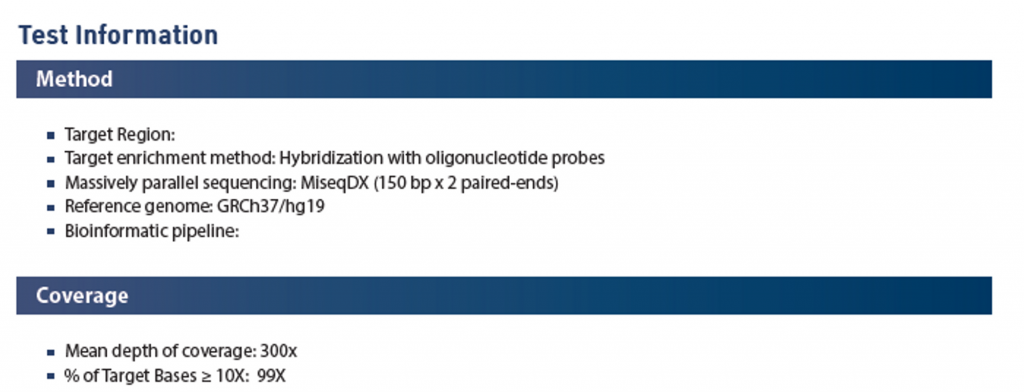- Test Code: ON140
Test Description
GCG Hereditary Cancer Panel analyses the genetic variants that cause hereditary cancers. Hereditary cancer, caused by innate genetic variants, is passed on from parents to child and the risk of developing cancer is significantly higher than other sporadic cancers. It is estimated that hereditary factors contribute to approximately 5-10% of all cancers.
The panel provides comprehensive analysis of the genetic variants that cause hereditary cancer with 98 relevant genes across 23 cancer types. However, It’s important to note that while hereditary factors may increase the risk of developing certain types of cancer, they do not guarantee that an individual will develop cancer. Environmental factors and individual lifestyle choices also play significant roles in cancer development.
By analyzing a broad range of genes, this test aims to provide valuable information of family health, assess personalized genetic risk, and and encourage patients to take proactive measures for their health.
Ordering information
- Turnaround time: 12 Days
- Specimen: EDTA WB 3ml
Assay information
- Target Region: 98 genes
- Target enrichment method: Hybridization with oligonucleotide probes
- Massively parallel sequencing: MiseqDX (150 bp x 2 paired-ends)
- Reference genome: GRCh37/hg19
Coverage (reference)
- Mean depth of coverage: 300x
- % of Target Bases ≥ 10X: 99X

Gene List (reference)
AIP , ALK, APC, ATM, BAP1, BARD1, BLM, BMPR1A, BRCA1, BRCA2, BRIP1, BUB1B, CDC73, CDH1, CDK4, CDKN1C, CDKN2A, CEBPA, CEP57, CHEK2, CYLD, DDB2, DICER1, DIS3L2, EGFR, EPCAM, ERCC2, ERCC3, ERCC4, ERCC5, EXT1, EXT2, EZH2, FANCA, FANCB, FANCC, FANCD2, FANCE, FANCF, FANCG, FANCI, FANCL, FANCM, FH, FLCN, GATA2, GPC3, HNF1A, HOXB13, HRAS, KIT, MAX, MEN1, MET, MLH1, MSH2, MSH6, MUTYH, NBN, NF1, NF2, NSD1, PALB2, PHOX2B, PMS1, PMS2, PPM1D, PRF1, PRKAR1A, PTCH1, PTEN, RAD51C, RAD51D, RB1, RECQL4, RET, RHBDF2, RUNX1, SBDS, SDHAF2, SDHB, SDHC, SDHD, SLX4, SMAD4, SMARCA4, SMARCB1, STK11, SUFU, TMEM127, TP53, TSC1, TSC2, VHL, WRN, WT1, XPA, XPC
Cancer/Tumor List (reference)
- Breast
- Ovaries
- Endometrium, Uterine
- Myometrium, Uterine
- Prostate Gland
- Stomach
- Large Bowel and Rectum
- Lung and Pleura
- Small Intestines
- Esophagus
- Urinary Tract and Bladder
- Exocrine Pancreas
- Endocrine Pancreas
- Kidneys
- Cervix
- Skin
- Bone
- Thyroid Gland
- Liver
- Soft Tissue
- Miscellaneous Endocrine Glands
- Blood
- Head and Neck
- Central Nervous System
- Peripheral Nervous System
Result

The test results will be provided according to the designated TAT. Review the sample report to see how the results are structured.
Limitations
- This test is performed by NGS technique. The genes included in the test include the entire exon, but in some areas sequencing may not be sufficiently covered. In addition, if a highly homologous sequence exists, the sequencing of the base may not be accurate, and exonic deletion/duplication, regulatory or deep intronic region, repeat expansion, imprinting defect etc. may be difficult to detect. Genetic variation is divided into ve categories, pathogenic variant (PV), likely pathogenic variant (LPV), variant of unknown significance (VUS), likely benign variant (LBV), and benign variant (BV), according to 2015 ACMG/AMP (Genet Med 2015;17:405-24). Likely benign variant (LBV) and Benign variant (BV) are not reported. However, the interpretation of the variation could be changed as additional evidence builds up after the results are reported.
Verifying more specific details about the Test
